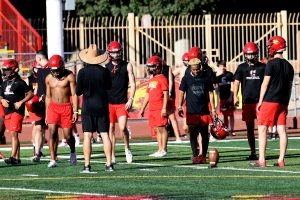- Slug: Sports-Coaching Skills, 1,062 words.
- Photos available.
By Kenneth Manoj
Cronkite News
PHOENIX – Forty nine years ago, President Richard M. Nixon declared October 6 National Coaches Day to honor individuals who teach not just sports, but necessary life skills.
“Coaches are highly qualified teachers – in highly specialized fields. But more than that, they are friends and counselors who help to instill in their charges important attitudes that will serve them all their lives,” Nixon said.
From teamwork and leadership acumen, to work ethic and discipline, there is as much if not more to learn about becoming a well-rounded adult as there is to learn about kicking a ball or swinging a golf club.
So why are coaches not always required to have the training necessary in order to teach these essential off-the-field skills?
Social and emotional learning skills, or SEL skills, are not new, but they are traits that haven’t always been valued in coaches. And they are especially beneficial at the youth and high school levels, when young minds crave direction.
“Everyone knows that sports teaches life skills,” said Mark Wood, Liberty High’s boys basketball coach. “What people do not talk about is – if we are not strategic in the skills we (want to) teach, then the skills (athletes) learn can sometimes be ‘narcissism,’ if they’re better than other players. That ‘rules don’t apply to them’ (or) ‘you can cheat if you don’t get caught.’
“We actually teach the wrong life lessons, through sports.”
According to the Aspen Institute, only 32.5% of youth coaches admitted to receiving training in 2019 on effective motivational techniques, which was an increase from 2018’s mark of 28%. Furthermore, over 43% of youth coaches admitted to never receiving such training, illustrating the severity of the problem.
Jennifer Kahn Donahue, a research manager at the EASEL Lab at the Harvard Graduate School of Education, works on projects in relation to social and emotional learning, and previously worked with the Aspen Institute to study the value of social and emotional skills for coaches and children. The findings were put together in a program, “Call for Coaches,”which highlights the specific skills coaches need to be trained in, the value of these skills and the effects on children.
“Sports settings are inherently good spaces to promote some of these important social and emotional learning skills,” Donahue said. She pointed out that while many of these skills are naturally taught in sports, such as helping children set and achieve goals and helping them build self-esteem, these skills are not being translated into their lives outside of sports.
This is where the importance of training coaches in social and emotional learning skills comes into play. When coaches teach these skills, they need to know how to teach them in such a way that the young athlete will see the value of using the skill outside of sports, and use them in the right ways.
A program called Arizona Basketball Coaches Association is leading the movement. Wood started it to create a proper system for coaches – from youth to college – to register, train and receive proper accreditation. The program also helps coaches create their own limited liability company so they can then create their own organized coaching programs.
“We have a lot of resources and things that these coaches can tap into to become better coaches,” said Todd Fazio, the boys varsity basketball coach at Highland High and a member of the ABCA.
“Players that play with a trained coach continue to play,” he said, explaining the impact a properly trained coach can have on young athletes. “Players that don’t play (with a) trained coach, don’t continue to play.”
On the national level, organizations like Coaching Corps are also working to create a better future for young athletes. Coaching Corps has put together multiple training programs for coaches, focusing on empathy and character building and showing them how to teach the same lessons to the young athletes.
“We want all kids to have access to a consistent, caring adult, and that for us is as a coach in sports,” said Suzanne Sillett, director of education and quality at Coaching Corps, adding that their other efforts, which include helping under-resourced schools and communities find trained coaches, assist their own pool of trained coaches and coaching positions.
Advocates say two common obstacles stand out: training’s financial cost, and a lack of motivation or interest in being trained.
While companies like Coaching Corps work with under-resourced communities and coaches to receive free training, the latter obstacle hits at the larger problem: Why is this training necessary?
As shown by Peter A. Witt and Tek B. Dangi in their 2018 article from “The Journal of Park and Recreation Administration,” a coach who fails to create a proper learning environment can have a damaging effect on young athletes. The article noted that a lack of a fun environment, negative coach behaviors and an overemphasis on winning were among the top reasons children drop out of sports. The authors outlined a number of changes that need to be implemented in youth sports as a whole, primarily with children below the age of 13:
- Regulating the length of season to three or four months, with a maximum of six months
- Limiting lengthy travel to organized competitions
- Introducing “grassroots” sport programs that focus on trying different sports
- Not implementing a selection process of more “talented” children until the specialization years
- Providing healthy competitive opportunities, but not overemphasize winning and long-term outcomes such as championships
- Discouraging early specialization in one sport
- Allowing children to play all positions in a given sport
- Promoting deliberate play within and beyond organized sport
- Designing play and practice activities that focus on fun and short-term reward
- Understanding children’s needs and not “overcoaching”
It boils down to this: What is the purpose of a coach, and how is a coach’s success evaluated?
Is the purpose of coaching to teach skills in the sport, to teach children how to become well-rounded athletes and individuals? Or is it to teach them that success is the only thing that matters and should be sought by any means necessary?
“The first question I would have to any coach – and when I say coach, I mean leader – ‘What is your transformational purpose?’” Wood said. “Meaning when kids, or your people, come through your organization, what benefit will the organization give to them that outlives their sports?”
For more stories from Cronkite News, visit cronkitenews.azpbs.org.

